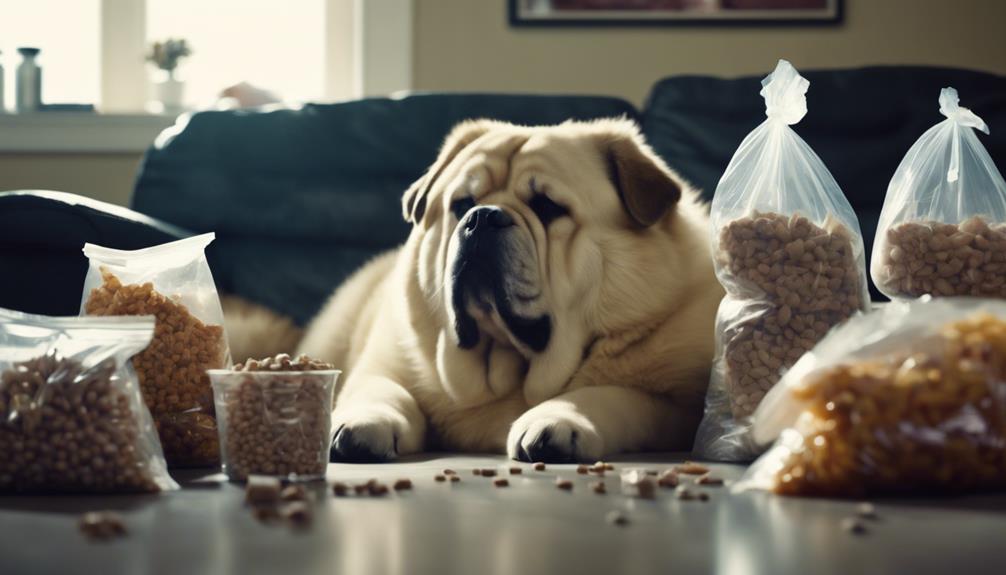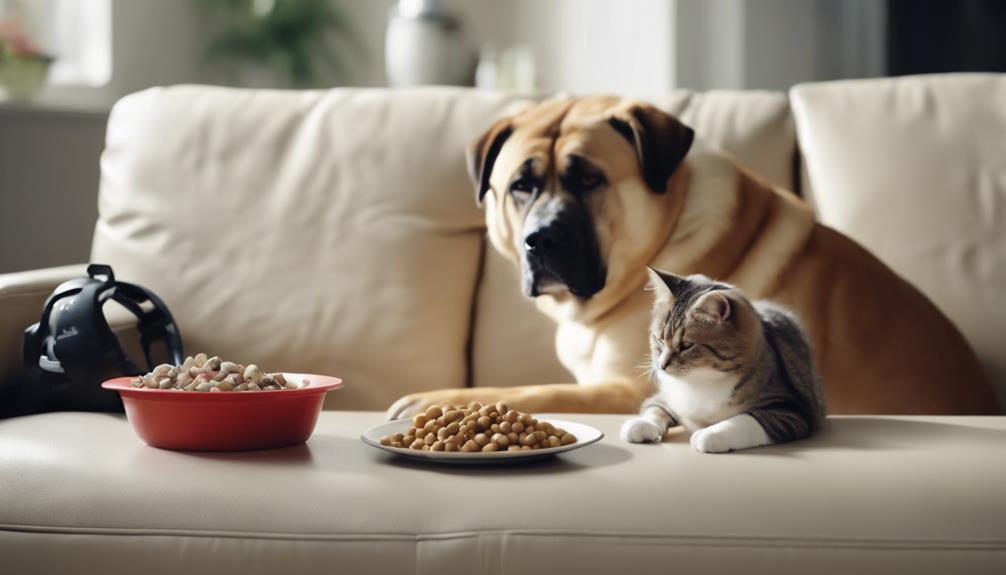The COVID-19 pandemic has brought about unforeseen changes, not only for humans but also for our furry companions. Veterinary professionals have observed a concerning trend of increased weight gain among dogs and cats during these challenging times.
The factors contributing to this rise in pet obesity are multifaceted, ranging from disrupted routines to heightened stress levels. As we delve further into the implications of this issue, it becomes evident that addressing pet weight management is crucial for ensuring the well-being of our beloved pets.
Key Takeaways
- Increased weight gain in pets during pandemic due to extra treats.
- Pet obesity rates rising, leading to health issues like diabetes.
- Owners using pandemic as opportunity to improve pets' health habits.
- Importance of monitoring pet weight and engaging in preventive care.
Pandemic Impact on Pet Weight
The pandemic has significantly contributed to an increase in pet weight, with one-third of pet owners acknowledging their pets have gained extra pounds during this period. With stay-at-home orders and increased time indoors, pets have faced changes in their routines and activity levels. These alterations, combined with the comfort and boredom eating tendencies shared by pets and humans, have led to weight gain in many animals.
The lack of structured exercise, coupled with the availability of more treats at home, has further exacerbated the issue. Understanding these factors is crucial in addressing the weight gain trend among pets and taking proactive steps to prevent associated health risks.
Rise in Pet Obesity Rates
With the ongoing pandemic exacerbating changes in pets' routines and activity levels, there has been a notable surge in pet obesity rates, reflecting the impact of increased weight gain among animals. This rise in pet obesity rates can be attributed to factors such as more sedentary lifestyles and excess treat consumption.
The following factors contribute to the increase in pet obesity during the COVID-19 pandemic:
- Reduced physical activity: Limited opportunities for exercise and outdoor play.
- Increased calorie intake: More treats given by owners while spending increased time at home.
- Changes in feeding schedules: Disrupted routines leading to irregular meal times.
Addressing these factors is crucial in combating the rise in pet obesity and promoting overall pet health.
Health Risks of Pet Obesity

Adverse health implications accompany pet obesity, posing significant risks to the overall well-being of animals. Obesity in pets can lead to various health conditions such as pancreatitis, heart disease, and diabetes. Additionally, overweight pets are at a higher risk of developing joint problems and experiencing a reduced quality of life. It is crucial for pet owners to recognize the dangers of obesity and take proactive steps to manage their pets' weight. Consultation with a veterinarian for a tailored weight loss plan, monitoring food portions, and incorporating regular exercise routines are essential strategies to combat pet obesity.
| Health Risks of Pet Obesity | Effects |
|---|---|
| Pancreatitis | Increased risk due to excess weight |
| Heart Disease | Strain on the cardiovascular system |
| Diabetes | Risk of developing insulin resistance |
| Joint Problems | Added stress on joints and bones |
| Reduced Quality of Life | Impact on overall well-being |
Comfort Eating in Pets
Excessive consumption of food as a coping mechanism during times of stress is a common behavior observed in pets, impacting their overall health and well-being. This comfort eating trend can lead to weight gain and various health issues.
To address this concern effectively, pet owners can consider the following strategies:
- Monitor food portions: Controlling the amount of food given to pets can help prevent overeating.
- Provide mental stimulation: Engaging pets in interactive activities can distract them from seeking comfort in food.
- Seek alternative comfort methods: Encouraging playtime, cuddling, or other forms of interaction can help alleviate stress without relying on excessive food consumption.
Improving Pet Health Habits

Pets' overall well-being can be significantly enhanced through the establishment of healthy habits that promote their physical and mental health. Implementing simple strategies and routines can help improve pet health and prevent issues like obesity. Here is a table outlining some key habits for enhancing pet well-being:
| Healthy Habit | Description | Benefits |
|---|---|---|
| Regular Exercise | Engage pets in daily physical activities like walks or play | Improves cardiovascular health and weight control |
| Balanced Nutrition | Provide a well-rounded diet with essential nutrients | Supports overall health and prevents deficiencies |
| Mental Stimulation | Offer interactive toys or puzzles to keep pets engaged | Reduces boredom, enhances cognitive abilities |
Alternatives to High-Calorie Treats
Amid the rising concern of pet obesity due to increased treat consumption during the pandemic, exploring alternatives to high-calorie treats becomes imperative for maintaining pets' health.
To help pet owners make healthier choices for their furry companions, consider the following alternatives:
- Carrots and Green Beans: Substitute high-calorie treats with fresh vegetables like carrots or green beans to provide a crunchy and nutritious option for pets.
- Small Treat Portions: Break down larger treats into smaller pieces to make them last longer and reduce the overall calorie intake during training or rewarding.
- Frozen Fruit Treats: Offer frozen fruit treats like berries or watermelon chunks as a refreshing and low-calorie option for pets to enjoy without the guilt.
Engaging Pets in Activities

Incorporating interactive activities is essential for keeping pets mentally and physically stimulated. Engaging pets in activities like interactive toys, puzzle feeders, and agility training can help prevent weight gain and promote overall well-being.
Interactive games such as hide and seek with treats or teaching new tricks provide mental stimulation while encouraging physical movement. Regular play sessions, indoor scavenger hunts, or setting up obstacle courses can keep pets active and entertained.
Additionally, rotating toys and activities can prevent boredom and support a healthy weight. By incorporating a variety of engaging activities into their routine, pet owners can help their furry companions stay fit, mentally sharp, and happy during the COVID-19 pandemic.
Increasing Indoor Activity Levels
Enhancing indoor activity levels for pets can be achieved through creative and stimulating strategies that promote physical movement and mental engagement. To prevent weight gain and promote overall well-being, consider:
- Interactive Toys: Invest in toys that encourage pets to move around actively, such as puzzle feeders or laser pointers.
- Obstacle Courses: Set up indoor obstacle courses using household items to create a fun and challenging environment for pets to navigate.
- Scheduled Playtime: Establish a routine for daily play sessions with pets, incorporating activities like fetch, tug-of-war, or agility exercises to keep them active and mentally stimulated.
Challenges in Pet Exercise

During the COVID-19 pandemic, pet owners have encountered various obstacles when it comes to ensuring adequate exercise for their furry companions. With restrictions in place, regular outdoor activities like walks have been disrupted, leading to decreased physical activity levels for pets.
Finding suitable indoor engagement activities that provide the necessary exercise can be a challenge. It is essential for pet owners to be creative and proactive in maintaining their pets' activity levels, such as adding extra blocks to walks or incorporating interactive play sessions.
As restrictions ease, pets may need time to readjust to their normal exercise routines. Despite the challenges faced, both pets and owners can work together to overcome these obstacles and prioritize their health and well-being.
Causes of Pet Obesity
The rise in pet obesity can be attributed to factors such as lack of exercise, stress-induced overeating, and disruptions in feeding schedules due to changes in pet owners' routines. These factors contribute to the concerning trend of pets gaining weight during the COVID-19 pandemic:
- Lack of Exercise: With restrictions limiting outdoor activities, pets may not be getting their regular exercise, leading to weight gain.
- Stress-Induced Overeating: Pets, like humans, may turn to food for comfort during times of stress, resulting in increased calorie intake.
- Disruptions in Feeding Schedules: Changes in pet owners' daily routines can impact when and how pets are fed, potentially causing irregular meal times and portion sizes.
Importance of Vet Visits

Regular veterinary visits play a crucial role in monitoring and maintaining the health and well-being of pets. These visits are essential for early detection of health issues, including obesity-related concerns. Vets can provide professional guidance on nutrition, weight management, and preventive care, helping to avoid long-term complications.
By consulting with a veterinarian regularly, pet owners can ensure that their pets receive tailored healthcare plans suited to their individual needs, promoting overall well-being and longevity. Additionally, vet visits offer an opportunity for community support, where pet owners can access resources on nutrition, exercise, and virtual consultations for non-emergency concerns.
Collaborations with local animal shelters and participation in pet weight loss challenges can further enhance the support system available for pet health and weight management.
Conclusion
In conclusion, the COVID-19 pandemic has contributed to a concerning increase in pet obesity rates among dogs and cats. This weight gain poses significant health risks and requires proactive measures to address.
By prioritizing regular exercise, healthy habits, and seeking guidance from veterinarians, pet owners can help combat this issue and ensure the long-term well-being of their beloved companions.
It is essential to understand the causes and consequences of pet obesity and take action to promote healthier lifestyles for pets.




